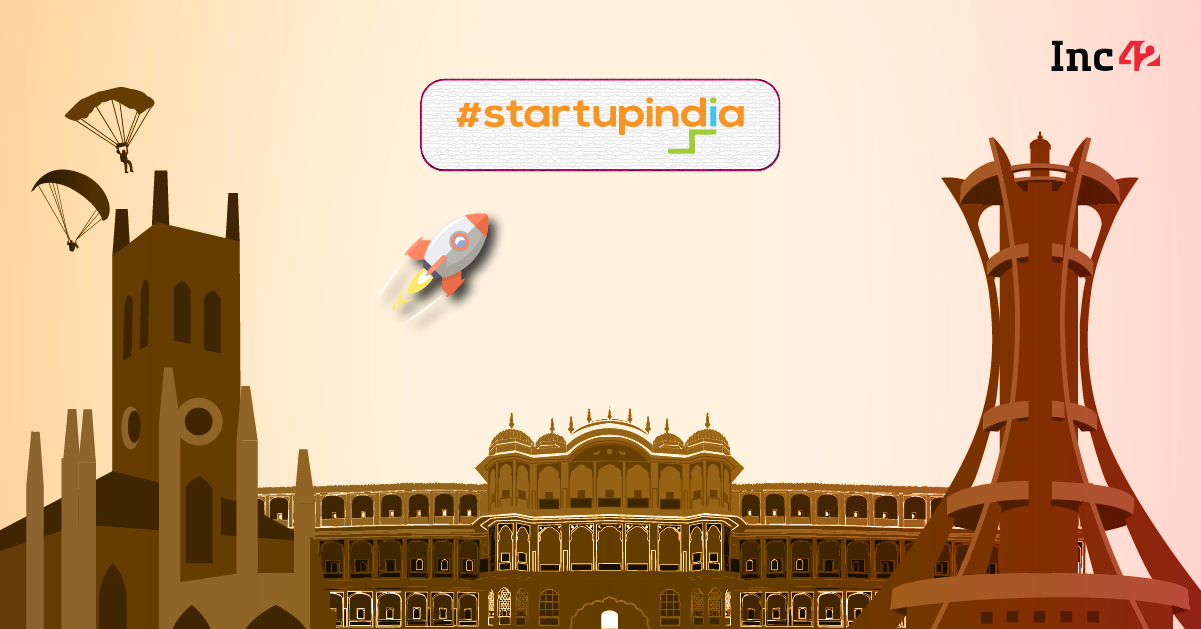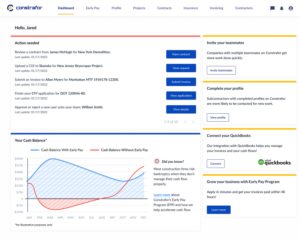The ‘Aspiring Leaders’ category features 11 states and UTs, the most of any of the five categories
The report scores a state on a scale of 100 with 26 action points including funding, mentorship and institutional support, positioning states based on a percentile scale
A total of 24 states and 7 UTs participated in the ranking report, based on the Startup Ranking Framework 2020
Rajasthan, Chhattisgarh & nine other states and union territories emerge as ‘Aspiring Leaders’ of the Indian startup ecosystem, as per the States’ Startup Ranking 2021 announced recently.
Piyush Goyal, the Union Minister of Commerce and Industry announced the States’ Startup Ranking 2021, the third edition of the rankings after being introduced in 2018.
An annual report, the States’ Startup Ranking is presented by the Department for Promotion of Industry and Internal Trade (DPIIT), ranking the country’s states and UTs according to their startup ecosystems.
The report scores a state on a scale of 100 with 26 action points such as funding, mentorship and institutional support. The positions have been awarded based on the percentile a state achieved within these action points.
For instance, if we say Rajasthan has a score of 34th percentile in the ‘Institutional Support’ Reform Area, this implies that the State has scored higher than 34% of the participating States/UTs in that area.
A total of 24 states and 7 UTs participated in the ranking report, based on the Startup Ranking Framework 2020.
While Gujarat, Karnataka and Meghalaya took the crown as the best performing states in their respective categories, India’s startup ecosystem is all set to expand to every nook and corner of the country as 11 states and union territories (UTs) were nominated as ‘Aspiring Leaders’.
Chhattisgarh, Delhi, Madhya Pradesh and Rajasthan were declared as Aspiring Leaders among Category A, while Chandigarh, Dadra and Nagar Haveli & Daman and Diu, Himachal Pradesh, Manipur, Nagaland, Puducherry and Tripura were the Aspiring Leaders from the Category B in the States’ Startup Ranking 2021.
Category A contained the states and UTs with a population of more than 10 Mn, while Category B contained the states and UTs with a population of less than 10 Mn.
These 11 states have been working on their startup policies, developing funding schemes and startup incubators, along with policies to increase the ease of doing business. However, except for Delhi, which is arguably India’s second-largest startup hub, none of these states even host a unicorn between them.
According to Goyal, India has 70,809 registered startups with the DPIIT, with the number set to rise. The minister also said that the number of registered startups does not represent the actual number of people with startup ideas, urging the state governments to get startups onboarded to the government’s systems.
With that said, here are the Aspiring Leaders of India’s startup ecosystem, as placed by the DPIIT and Startup India, placed as per the States’ Startup Ranking 2021.
Aspiring Leaders Of States’ Startup Ranking 2021
Rajasthan
According to the States’ Startup Ranking 2021 report, Rajasthan participated in all 26 action points under the Startup Ranking Framework 2020. In terms of institutional support, Rajasthan scored the 34th percentile, while in terms of incubation, mentorship and funding support, the state scored zero.
On the other hand, the capacity building of enablers parameter saw India’s largest state by land area score in the 80th percentile. Rajasthan scored 9th percentile and 5th percentile in access to market and fostering innovation and entrepreneurship, respectively.
According to DPIIT, Rajasthan has 5+ incubators and 300+ registered startups, with the funding support of more than INR 2.5 Cr. The state has more than 50 women-led startups and more than 10 registered startup mentors. The state introduced the Rajasthan Startup policy in 2015 to further the spirit of entrepreneurship.
Chhattisgarh
Chhattisgarh participated in only around 16 of the 26 action points in the Startup Ranking Framework 2020. The state did well in institutional support and capacity building of enablers, scoring 31st and 20th percentile, respectively.
However, Chhattisgarh scored the zeroth percentile in incubation, mentorship and funding support. Lastly, the state’s scores in access to market and fostering innovation and entrepreneurship were 4th and 2nd percentile respectively.
According to the DPIIT figures, the state has more than 600 startups, with more than 115 mentors registered and more than 20 incubators. The state introduced a new startup policy and action plan for the year 2019 to 2024 to keep up with the needs of the startups.
Himachal Pradesh
Like Rajasthan, Himachal Pradesh participated in all 26 action points under the 2020 framework for startup ranking. The state’s best metric was funding support, where it did better than 50% of all participating states and UTs.
Fostering innovation and entrepreneurship, capacity building of enablers and institutional support were the only other metrics where Himachal Pradesh had a non-zero percentile, with 42nd, 33rd and 27th percentile respectively. The state scored a zero on access to market, mentorship and incubation support.
The state has more than 10 incubators, along with INR 5 Cr disbursed to startups and incubators. The state introduced its startup policy in 2016.
Madhya Pradesh
Madhya Pradesh participated in all of the action points and scored across all metrics except mentorship support. The state’s best metric was institutional support, scoring 31st percentile in the metric.
Incubation support and capacity building of enablers were Madhya Pradesh’s second and third-best metrics, with 27th and 20th percentile respectively. Madhya Pradesh scored in the 4th percentile each in funding support, access to market and fostering innovation and entrepreneurship.
The state has more than 1500 registered startups, along with more than 100 incubators and INR 1 Cr financial support provided to startups from the state. Madhya Pradesh introduced its startup policy in 2019.
Delhi
Arguably India’s second-largest startup hub after Bengaluru in Karnataka (which topped the list), Delhi performs rather poorly for the size of its startup ecosystem. The national capital territory languishes halfway down the list of Aspiring Leaders, which is the category second from the bottom, only above Emerging Startup Ecosystems.
Delhi’s best metric was incubation support, with only the 26th percentile. For comparison, Karnataka scores in the 68th percentile. Delhi’s other non-zero metrics include capacity building of enablers, fostering innovation and entrepreneurship and institutional support. The state scored 20th, 17th and 6th percentile respectively.
Delhi has a zero score on access to market, funding support and mentorship support, a damning contrast with the states it seeks to compete with. Karnataka has three metrics where it has scored a 100th percentile and only one with zero.
The national capital has more than 6,500 registered startups, the most in the country, with more than 1,600 financially supported startups. Delhi also has more than 30 incubators. The UT is currently working on a new startup policy, the draft of which was announced in May.
Chandigarh
The UT sandwiched between Punjab and Haryana places below Delhi and participated in all 26 action points. Surprisingly, Chandigarh performed remarkably well in fostering innovation and entrepreneurship, scoring the 61st percentile.
Capacity building of enablers and institutional support was also judged to be decent in Chandigarh, with 33rd percentile and 27th percentile, respectively. Chandigarh was better than only about 8% of all participants in terms of market access, while it scored a zero in incubation, funding and mentorship support.
UT’s startup policy was introduced in 2017, with a focus on the IT industry. Chandigarh has one incubator, called the SPIC (Society for Promotion of IT in Chandigarh), along with five registered mentors.
Nagaland
Nagaland participated in only three of the 26 action points of the ranking framework, with its best-performing metric being the capacity building of enablers, at the 33rd percentile.
The northeastern state scored in the 15th percentile in institutional support and the 5th percentile in fostering innovation and entrepreneurship. In all the other metrics, Nagaland scored a zero since it did not participate.
The Nagaland Startup Policy 2019 focuses on ‘Made in Nagaland’ and is supporting startups in the region. The state does not maintain a list of registered startups or mentors in the region; a suggestion has been made in the report to do the same.
Dadra & Nagar Haveli And Daman & Diu
The UT of Dadra & Nagar Haveli and Daman & Diu participated in only around nine of the 26 metrics of the ranking framework of 2020. The UT’s best metric was market access, scoring the 75th percentile.
Capacity building of enablers and fostering innovation and entrepreneurship were the only two non-zero metrics, with the UT scoring 33rd percentile and 6th percentile, respectively.
The UT introduced the Startup and Innovation Policy in 2020, with a focus to boost the startup culture in the region. The region already has a big MSME culture, with most of the enterprises coming under the MSME category. The government does not maintain figures for registered startups or mentors in the region.
Manipur
The second northeastern state on the Aspiring Leaders list, Manipur participated in 13 of the 26 action points. The state did well in the capacity building of enablers metric, scoring the 33rd percentile.
Fostering innovation and entrepreneurship and institutional support are the only other non-zero metrics, with 16th and 15th percentile respectively. Across the rest of the metrics, Manipur did not participate and hence scored a zero.
Manipur introduced its startup policy in 2016, intending to make it the top startup destination in the northeast. The state, like many others in this category, does not maintain the number of registered startups or mentors in the region.
While it was mentioned that Manipur offers financial and infrastructural support to startups, there is no definite figure on the number of incubators in the state.
Tripura
The third northeastern state on the list, Tripura participated in only nine of the 26 action points. The state performed well in the metrics it participated in, scoring a 46th percentile in institutional support, better than the likes of Delhi, Rajasthan and Himachal Pradesh.
Along with institutional support, Tripura scored in the 33rd percentile in capacity building of enablers and 22nd percentile in fostering innovation and entrepreneurship. The rest of the metrics clocked in at zero since Tripura did not participate in the same.
Tripura introduced its startup policy in 2019, set up a State Startup Portal, and provided support in the form of incubation, mentorship, and various capacity-building programs.
Tripura has more than 30 registered startups and it has supported five+ startups financially. It has conducted more than two programs for students at HEIs to encourage the spirit of startups.
Puducherry
The southern UT of Puducherry participated in seven of the 26 action points under the ranking framework of 2020. The UT scored in the 33rd percentile in capacity building of enablers, which was its best metric.
Puducherry scored in the 25th percentile in access to market, 15th percentile in fostering innovation and entrepreneurship and 6th percentile in incubation support. The rest metrics were put down as zero due to non-participation.
The UT introduced its startup policy in 2019 aimed at driving sustainable economic growth and generating large-scale employment opportunities. The UT organised the Puducherry Startup Summit 2019 to boost startup culture in the region. While the total number in the region was not clarified, the report said that Puducherry has incubated more than 15 startups so far.






![Read more about the article [Funding alert] Singapore-based Cialfo raises $20M from Tiger Global; eyes India expansion](https://blog.digitalsevaa.com/wp-content/uploads/2022/03/Image3ll7-1646987108632-300x150.jpg)



